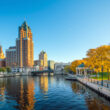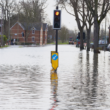ON THE RECORD/NLC leader stresses need for networking
The National League of Cities (NLC) will be inducting Washington, D.C., Mayor Anthony Williams as its new president at its annual conference in December. Mayor Williams has served in a variety of state, local and government roles, including chief financial officer of the Boston Redevelopment Authority. American City & County talked to Mayor Williams about his upcoming role as NLC president and about his local government experience.
Q: How has your varied service in government brought you to this point in your career?
Williams: I think that working at the local, state and federal level, as well as working with finance and systems, has given me a unique perspective on the inner workings of government and the connection between vision and reality. You know the old saying, “To plan is human, to implement is divine.” It gives you an understanding of the challenges in any implementation.
Q: Coming from a financial background most recently, what do you see as the biggest fiscal challenge for city governments?
A: The responsibilities for local government — everything from homeland security, your regular garden-variety public safety, social services expenditures, education — are big-ticket items. [Cities] have to meet all these requirements at a time when folks’ appetites for new tax increases crimp what state or federal aid is available to these local governments to do their job.
Q: What made you get involved with NLC and leadership roles there?
A: What attracts me to NLC is the scope of the organization; the number of people represented; and particularly the fact that I think there’s an opportunity to forge an agenda around the needs and requirements of regions as powerful engines and entities because you have represented in the NLC all the key ingredients. You have the outer-ring suburban towns, inner-ring towns, as well as cities. It’s a unique combination where all these folks come together from the most rural to the most urban settings.
Q: What are your goals for the organization?
A: Well, certainly one very unique goal for me, as mayor of Washington, D.C., is to use my platform to educate the citizens of the United States on the unique status of the District of Columbia as the nation’s capital. The challenge remaining is to achieve representation in Congress. My broader goal for the organization is to revolutionize the infrastructure of the organization in terms of building the network for connection to cities and towns through our TV stations, publications and our Web site.
Q: What would you like to see the federal government do to help make cities safer?
A: I think there has to be a buy-in from our local cities and towns on the template and the standards for the distribution and allocation of homeland security funds. It’s a balance. On the one hand, the smallest cities may have threats because there may be anything from a nuclear plant to a power plant to a key nexus of railroads or highways or airports. On the other hand, it’s clear that your major regional centers are deserving of a higher degree of federal dollars and involvement because of their nature. One of the things I hope to do is really build a consensus among our cities and towns on what that criteria and allocation are in conjunction with our federal government.
Q: What advice do you have for city government leaders?
A: I believe the need to network and partner between and among ourselves and the private and nonprofit sectors has never been greater, because the federal government is not going to be our salvation.



















